人教版(2019)必修一:Unit1 Teenage life 单元同步练习(含答案)
文档属性
| 名称 | 人教版(2019)必修一:Unit1 Teenage life 单元同步练习(含答案) | 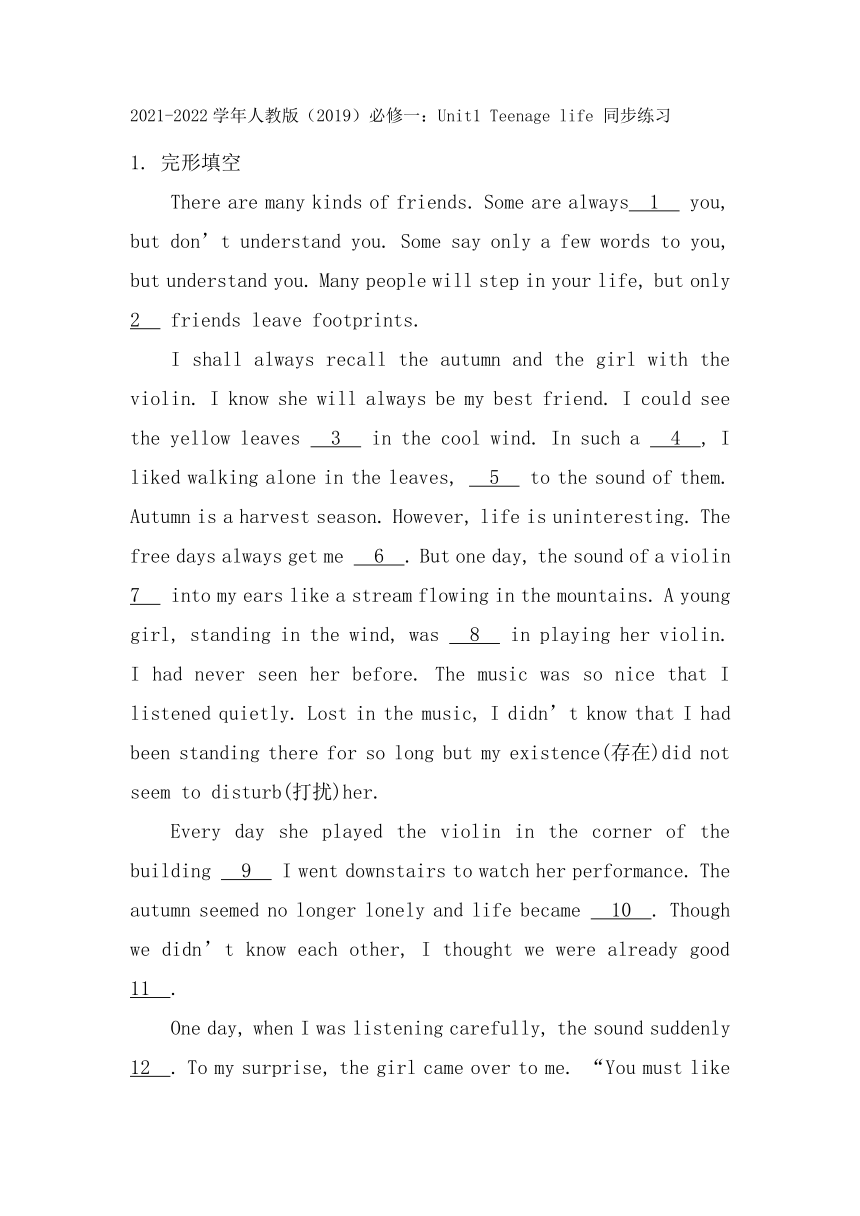 | |
| 格式 | docx | ||
| 文件大小 | 33.5KB | ||
| 资源类型 | 教案 | ||
| 版本资源 | 人教版(2019) | ||
| 科目 | 英语 | ||
| 更新时间 | 2021-09-04 07:38:39 | ||
图片预览

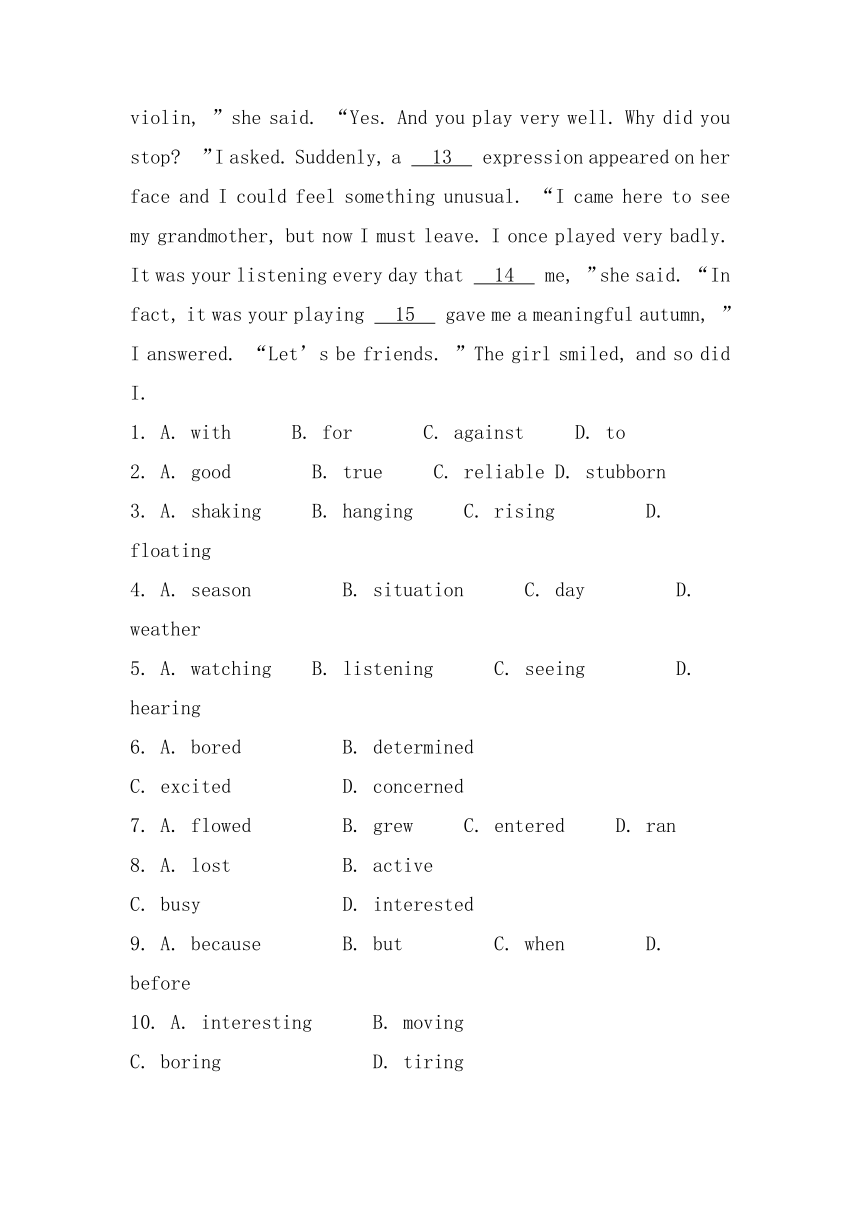
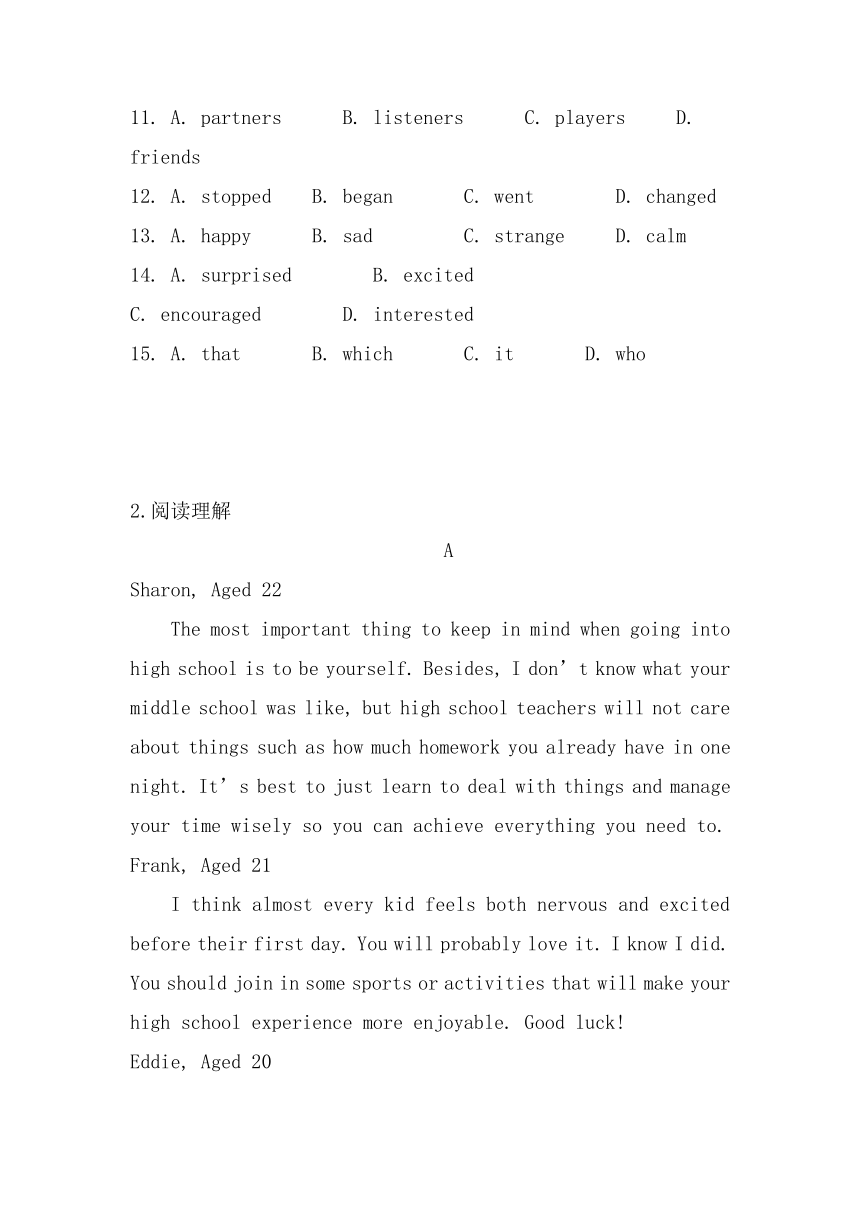
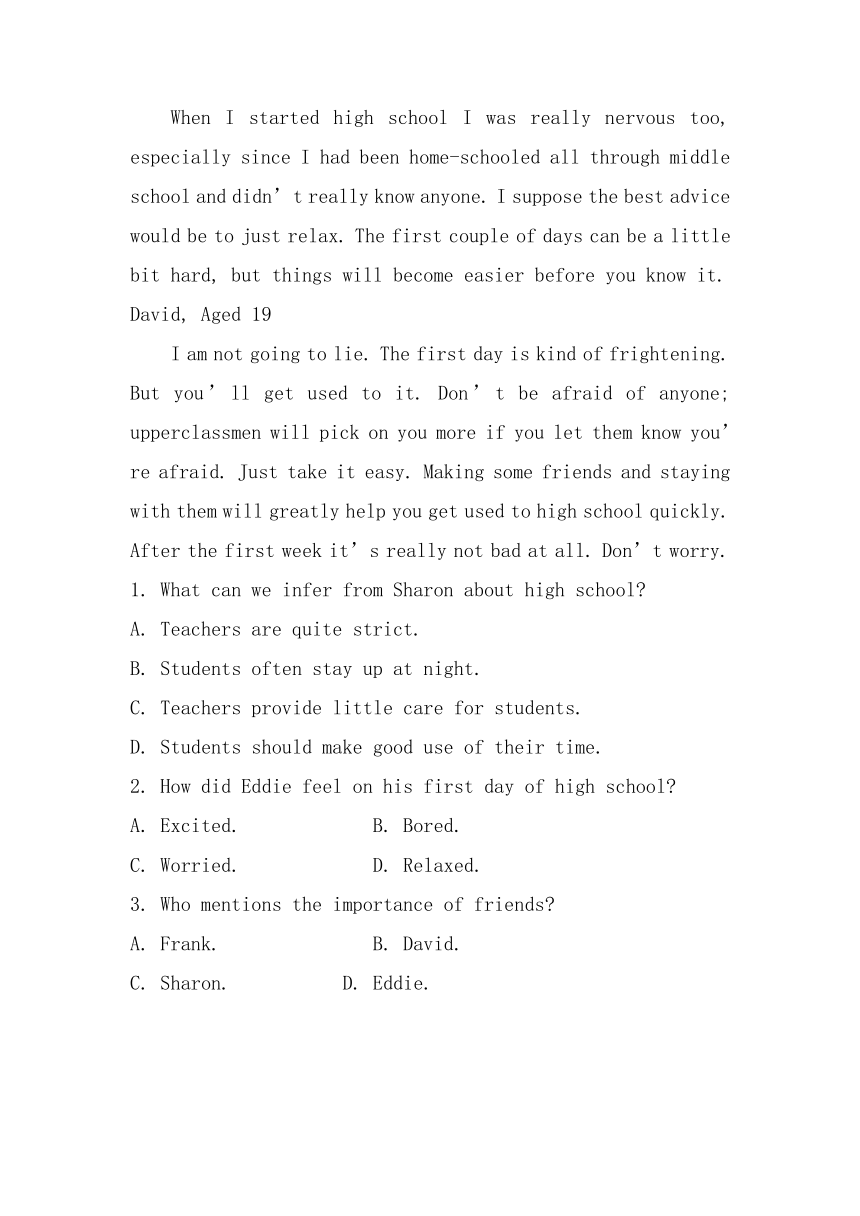
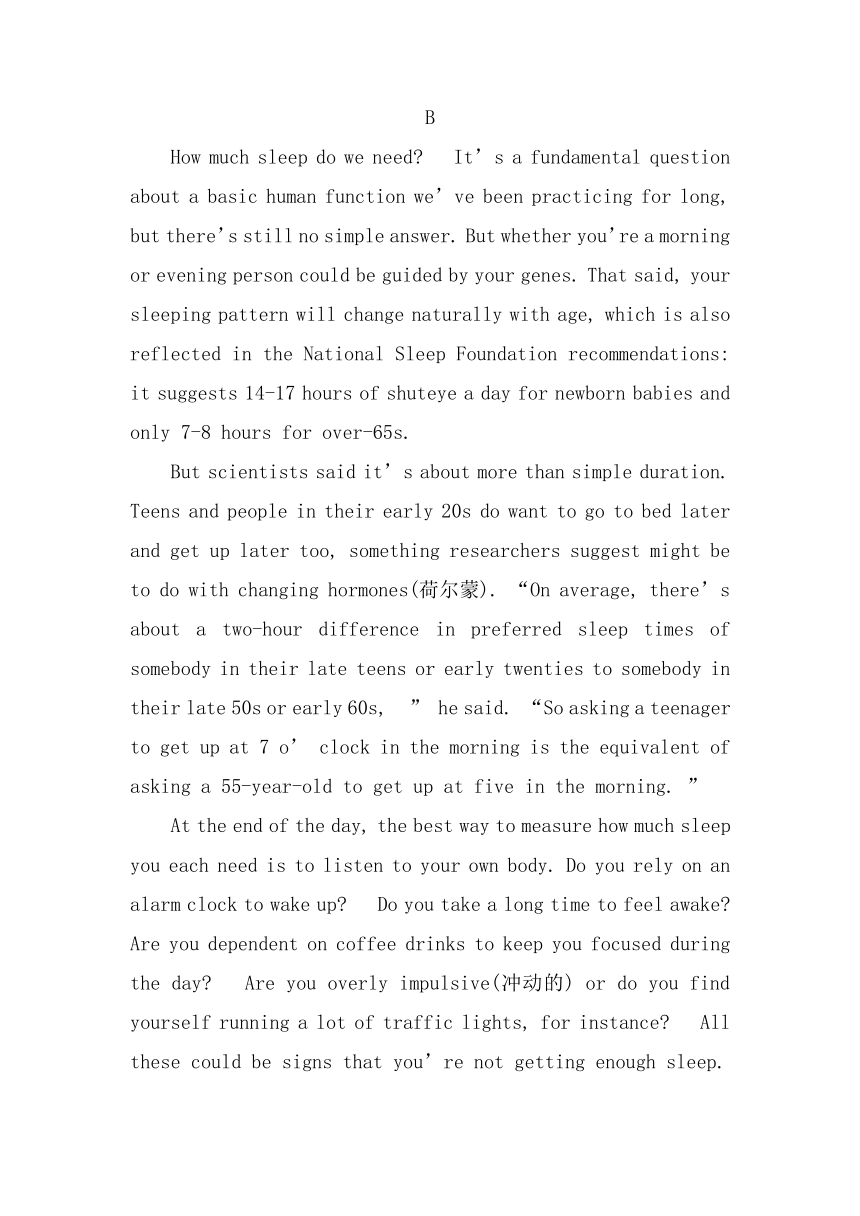
文档简介
2021-2022学年人教版(2019)必修一:Unit1
Teenage
life
同步练习
1.
完形填空
There
are
many
kinds
of
friends.
Some
are
always 1
you,
but
don’t
understand
you.
Some
say
only
a
few
words
to
you,
but
understand
you.
Many
people
will
step
in
your
life,
but
only
2
friends
leave
footprints.
?
I
shall
always
recall
the
autumn
and
the
girl
with
the
violin.
I
know
she
will
always
be
my
best
friend.
I
could
see
the
yellow
leaves
3
in
the
cool
wind.
In
such
a
4 ,
I
liked
walking
alone
in
the
leaves,
5
to
the
sound
of
them.
Autumn
is
a
harvest
season.
However,
life
is
uninteresting.
The
free
days
always
get
me
6 .
But
one
day,
the
sound
of
a
violin
7
into
my
ears
like
a
stream
flowing
in
the
mountains.
A
young
girl,
standing
in
the
wind,
was
8
in
playing
her
violin.
I
had
never
seen
her
before.
The
music
was
so
nice
that
I
listened
quietly.
Lost
in
the
music,
I
didn’t
know
that
I
had
been
standing
there
for
so
long
but
my
existence(存在)did
not
seem
to
disturb(打扰)her.
?
Every
day
she
played
the
violin
in
the
corner
of
the
building
9
I
went
downstairs
to
watch
her
performance.
The
autumn
seemed
no
longer
lonely
and
life
became
10 .
Though
we
didn’t
know
each
other,
I
thought
we
were
already
good
11 .
?
One
day,
when
I
was
listening
carefully,
the
sound
suddenly 12 .
To
my
surprise,
the
girl
came
over
to
me.
“You
must
like
violin,
”she
said.
“Yes.
And
you
play
very
well.
Why
did
you
stop?
”I
asked.
Suddenly,
a
13
expression
appeared
on
her
face
and
I
could
feel
something
unusual.
“I
came
here
to
see
my
grandmother,
but
now
I
must
leave.
I
once
played
very
badly.
It
was
your
listening
every
day
that
14
me,
”she
said.
“In
fact,
it
was
your
playing
15
gave
me
a
meaningful
autumn,
”I
answered.
“Let’s
be
friends.
”The
girl
smiled,
and
so
did
I.
?
1.
A.
with B.
for
C.
against
D.
to
2.
A.
good
B.
true
C.
reliable
D.
stubborn
3.
A.
shaking
B.
hanging
C.
rising
D.
floating
4.
A.
season
B.
situation
C.
day
D.
weather
5.
A.
watching
B.
listening
C.
seeing
D.
hearing
6.
A.
bored
B.
determined
C.
excited
D.
concerned
7.
A.
flowed
B.
grew
C.
entered
D.
ran
8.
A.
lost
B.
active
C.
busy
D.
interested
9.
A.
because
B.
but
C.
when
D.
before
10.
A.
interesting
B.
moving
C.
boring
D.
tiring
11.
A.
partners
B.
listeners
C.
players
D.
friends
12.
A.
stopped
B.
began
C.
went
D.
changed
13.
A.
happy
B.
sad
C.
strange
D.
calm
14.
A.
surprised
B.
excited
C.
encouraged
D.
interested
15.
A.
that
B.
which
C.
it
D.
who
2.阅读理解
A
Sharon,
Aged
22
The
most
important
thing
to
keep
in
mind
when
going
into
high
school
is
to
be
yourself.
Besides,
I
don’t
know
what
your
middle
school
was
like,
but
high
school
teachers
will
not
care
about
things
such
as
how
much
homework
you
already
have
in
one
night.
It’s
best
to
just
learn
to
deal
with
things
and
manage
your
time
wisely
so
you
can
achieve
everything
you
need
to.
Frank,
Aged
21
I
think
almost
every
kid
feels
both
nervous
and
excited
before
their
first
day.
You
will
probably
love
it.
I
know
I
did.
You
should
join
in
some
sports
or
activities
that
will
make
your
high
school
experience
more
enjoyable.
Good
luck!
Eddie,
Aged
20
When
I
started
high
school
I
was
really
nervous
too,
especially
since
I
had
been
home-schooled
all
through
middle
school
and
didn’t
really
know
anyone.
I
suppose
the
best
advice
would
be
to
just
relax.
The
first
couple
of
days
can
be
a
little
bit
hard,
but
things
will
become
easier
before
you
know
it.
David,
Aged
19
I
am
not
going
to
lie.
The
first
day
is
kind
of
frightening.
But
you’ll
get
used
to
it.
Don’t
be
afraid
of
anyone;
upperclassmen
will
pick
on
you
more
if
you
let
them
know
you’re
afraid.
Just
take
it
easy.
Making
some
friends
and
staying
with
them
will
greatly
help
you
get
used
to
high
school
quickly.
After
the
first
week
it’s
really
not
bad
at
all.
Don’t
worry.
1.
What
can
we
infer
from
Sharon
about
high
school?
A.
Teachers
are
quite
strict.
B.
Students
often
stay
up
at
night.
C.
Teachers
provide
little
care
for
students.
D.
Students
should
make
good
use
of
their
time.
2.
How
did
Eddie
feel
on
his
first
day
of
high
school?
A.
Excited.
B.
Bored.
C.
Worried.
D.
Relaxed.
3.
Who
mentions
the
importance
of
friends?
A.
Frank.
B.
David.
C.
Sharon.
D.
Eddie.
B
How
much
sleep
do
we
need?
It’s
a
fundamental
question
about
a
basic
human
function
we’ve
been
practicing
for
long,
but
there’s
still
no
simple
answer.
But
whether
you’re
a
morning
or
evening
person
could
be
guided
by
your
genes.
That
said,
your
sleeping
pattern
will
change
naturally
with
age,
which
is
also
reflected
in
the
National
Sleep
Foundation
recommendations:
it
suggests
14-17
hours
of
shuteye
a
day
for
newborn
babies
and
only
7-8
hours
for
over-65s.
But
scientists
said
it’s
about
more
than
simple
duration.
Teens
and
people
in
their
early
20s
do
want
to
go
to
bed
later
and
get
up
later
too,
something
researchers
suggest
might
be
to
do
with
changing
hormones(荷尔蒙).
“On
average,
there’s
about
a
two-hour
difference
in
preferred
sleep
times
of
somebody
in
their
late
teens
or
early
twenties
to
somebody
in
their
late
50s
or
early
60s,
”
he
said.
“So
asking
a
teenager
to
get
up
at
7
o’
clock
in
the
morning
is
the
equivalent
of
asking
a
55-year-old
to
get
up
at
five
in
the
morning.
”
At
the
end
of
the
day,
the
best
way
to
measure
how
much
sleep
you
each
need
is
to
listen
to
your
own
body.
Do
you
rely
on
an
alarm
clock
to
wake
up?
Do
you
take
a
long
time
to
feel
awake?
Are
you
dependent
on
coffee
drinks
to
keep
you
focused
during
the
day?
Are
you
overly
impulsive(冲动的)
or
do
you
find
yourself
running
a
lot
of
traffic
lights,
for
instance?
All
these
could
be
signs
that
you’re
not
getting
enough
sleep.
And
that,
we
know
today,
is
bad.
The
environment
can
affect
your
sleep
preferences
but
your
genes
stay.
Scientists
said
that
the
understanding
of
the
importance
of
sleep
was
“one
of
the
great
achievements
of
modern
neuroscience(神经科学),
”
and
that
society
was
moving
away
from
the
all-nighter
culture
to
respect
the
need
for
sleep.
4.
What’s
the
writer’s
intention
of
writing
the
passage?
A.
To
report
his
research
results.
B.
To
express
the
importance
of
sleep.
C.
To
list
some
sleeping
patterns.
D.
To
persuade
people
to
have
enough
sleep.
5.
What
would
not
change
according
to
the
passage?
A.
Age.
B.
Genes.
C.
Hormones.
D.
Sleeping
pattern.
6.
What
does
the
underlined
word
“that”
in
the
last
paragraph
refer
to?
A.
Not
getting
enough
sleep.
B.
Listening
to
your
own
body.
C.
Running
a
lot
of
traffic
lights.
D.
Not
understanding
of
the
importance
of
sleep.
7.
Which
is
the
best
title
for
the
passage?
A.
Sleeping
Patterns
B.
The
Importance
of
Sleep
C.
Different
People
Need
Different
Amounts
of
Sleep
D.
A
Great
Achievement
of
Neuroscience
3.
书面表达
假定你是李华。下学期你将作为交换生(exchange
student)去加拿大一所高中学习,
住在Lynn家里。请给Lynn写一封邮件,
内容包括:
1.
介绍自己;
2.
告知到达时间;
3.
询问应做何准备。
注意:
1.
词数80个左右;
2.
可以适当增加细节,
以使行文连贯。
___________________________________________________________
参考答案:
1.完形填空
1.A
词语辨析题。with和……在一起;
for为了;
against反对;
to对……。句意:
一些朋友总是和你在一起,
但不理解你。
2.B词语辨析题。good好的;
true真正的;
reliable可靠的;
stubborn固执的。句意:
许多人会走进你的生活,
但只有真正的朋友会留下印迹。
3.D
词语辨析题。shake摇摆;
hang悬挂;
rise上升;
float飘动。句意:
“我”能看到黄色的叶子在凉爽的风中飘动。
4.A
词汇复现题。由下句Autumn
is
a
harvest
season可知,
在这样的季节,
“我”喜欢在(飘动的)叶子中独自一人漫步,
听它们的声音。
5.B
词语辨析题。watch注视;
listen听;
see看见;
hear听到。句意:
在这样的季节,
“我”喜欢在(飘动的)叶子中独自一人漫步,
听它们的声音。
6.A
逻辑推理题。bored感到枯燥的;
determined坚定的;
excited激动的;
concerned关心的。由上文生活是无趣的可知,
无所事事的日子总是让“我”感到枯燥。
7.A
词汇复现题。flow流;
grow成长;
enter进入;
run跑。由题空后like
a
stream
flowing
in
the
mountains可知,
一天,
小提琴的声音像流在山间的小溪一样流进“我”的耳朵。
8.A
习语搭配题。lost失去的;
active积极的;
busy繁忙的;
interested感兴趣的。句意:
一个年轻的女孩,
站在风中,
沉浸在拉小提琴中。此处be
lost
in意为“沉浸在……之中”。
9.C
语法结构题。because因为;
but但是;
when当……的时候;
before在……之前。句意:
每天她在大楼的角落里拉小提琴,
这时“我”都会下楼来看她的表演。
10.A
词语辨析题。interesting有趣的;
moving令人感动的;
boring令人厌烦的;
tiring令人劳累的。
11.D
词汇复现题。由上文I
know
she
will
always
be
my
best
friend可知,
虽然我们不认识,
但我们已经是朋友。
12.A
词语辨析题。stop停止;
begin开始;
go去;
change改变。句意:
一天,
当“我”仔细地听的时候,
声音突然停止了。
13.B
逻辑推理题。由something
unusual可知,
突然一种悲伤的表情出现在她的脸上,
“我”能感到有些异常。
14.C
词语辨析题。surprise使吃惊;
excite使激动;
encourage鼓舞;
interest使感兴趣。句意:
正是你每天听“我”的演奏,
才使“我”受到鼓舞。
15.A
考查强调句型。句意:
正是你的演奏给了“我”一个有意义的秋天。
2.阅读理解
1.D
细节理解题。根据第一段最后一句“It’s
best
to
just
learn
to
deal
with
things
and
manage
your
time
wisely
so
you
can
achieve
everything
you
need
to.
”可知,
Sharon认为在高中阶段要学会处理事情,
学会合理安排时间,
故选D。
2.C
细节理解题。根据第三段中的“When
I
started
high
school
I
was
really
nervous
too.
.
.
”可知,
当Eddie刚开始上高中的时候很紧张,
很担忧。故选C。
3.B
细节理解题。根据最后一段中的“Making
some
friends
and
staying
with
them
will
greatly
help
you
get
used
to
high
school
quickly.
”可知,
David认为交朋友很重要,
故选B。
4.D
推理判断题。根据第三段最后一句All
these
could
be
signs
that
you’re
not
getting
enough
sleep.
和最后一段的And
that,
we
know
today,
is
bad.
“所有这些都可能是你睡眠不足的迹象,
我们现在都知道睡眠不足是不好的”可推知,
作者写此篇文章的意图是去说服人们有足够的睡眠,
故选D。
5.B
细节理解题。根据最后一段的The
environment
can
affect
your
sleep
preferences
but
your
genes
stay.
环境会影响你的睡眠偏好,
但你的基因不会改变。由此可知,
你的基因是不会改变的,
故选B。
6.A
词义猜测题。根据第三段最后一句All
these
could
be
signs
that
you’re
not
getting
enough
sleep.
和最后一段的And
that,
we
know
today,
is
bad.
可知所有这些都可能是你睡眠不足的迹象,
睡眠不足是不好的。由此可知that用来指代前文事物,
表示特指,
故此处that指代前文的not
getting
enough
sleep,
故选A。
7.C
主旨大意题。浏览全文以及文章第一段的That
said,
your
sleeping
pattern
will
change
naturally
with
age.
.
.
it
suggests
14-17
hours
of
shuteye
a
day
for
newborn
babies
and
only
7-8
hours
for
over-65s.
你的睡眠模式会随着年龄的增长而自然改变……新生儿每天要睡14-17个小时,
65岁以上的人每天只睡7-8个小时。由此可知,
不同的人需要不同的睡眠时间,
故C选项能作为文章标题。
3.书面表达
Dear
Lynn,
I’m
Li
Hua,
an
exchange
student
from
China.
Glad
to
know
that
I’ll
be
staying
with
your
family
while
studying
at
a
local
senior
high
school.
Learning
this
information,
I
feel
extraordinarily
excited
because
I
can
have
the
chance
to
communicate
with
you
natives.
I
will
arrive
in
Toronto
on
August
20th
and
get
to
your
place
late
that
afternoon.
I
wonder
if
you
could
give
me
some
advice
so
that
I
can
get
myself
better
prepared
for
my
stay
in
Canada.
Looking
forward
to
seeing
you.
Yours
sincerely,
Li
Hua
Teenage
life
同步练习
1.
完形填空
There
are
many
kinds
of
friends.
Some
are
always 1
you,
but
don’t
understand
you.
Some
say
only
a
few
words
to
you,
but
understand
you.
Many
people
will
step
in
your
life,
but
only
2
friends
leave
footprints.
?
I
shall
always
recall
the
autumn
and
the
girl
with
the
violin.
I
know
she
will
always
be
my
best
friend.
I
could
see
the
yellow
leaves
3
in
the
cool
wind.
In
such
a
4 ,
I
liked
walking
alone
in
the
leaves,
5
to
the
sound
of
them.
Autumn
is
a
harvest
season.
However,
life
is
uninteresting.
The
free
days
always
get
me
6 .
But
one
day,
the
sound
of
a
violin
7
into
my
ears
like
a
stream
flowing
in
the
mountains.
A
young
girl,
standing
in
the
wind,
was
8
in
playing
her
violin.
I
had
never
seen
her
before.
The
music
was
so
nice
that
I
listened
quietly.
Lost
in
the
music,
I
didn’t
know
that
I
had
been
standing
there
for
so
long
but
my
existence(存在)did
not
seem
to
disturb(打扰)her.
?
Every
day
she
played
the
violin
in
the
corner
of
the
building
9
I
went
downstairs
to
watch
her
performance.
The
autumn
seemed
no
longer
lonely
and
life
became
10 .
Though
we
didn’t
know
each
other,
I
thought
we
were
already
good
11 .
?
One
day,
when
I
was
listening
carefully,
the
sound
suddenly 12 .
To
my
surprise,
the
girl
came
over
to
me.
“You
must
like
violin,
”she
said.
“Yes.
And
you
play
very
well.
Why
did
you
stop?
”I
asked.
Suddenly,
a
13
expression
appeared
on
her
face
and
I
could
feel
something
unusual.
“I
came
here
to
see
my
grandmother,
but
now
I
must
leave.
I
once
played
very
badly.
It
was
your
listening
every
day
that
14
me,
”she
said.
“In
fact,
it
was
your
playing
15
gave
me
a
meaningful
autumn,
”I
answered.
“Let’s
be
friends.
”The
girl
smiled,
and
so
did
I.
?
1.
A.
with B.
for
C.
against
D.
to
2.
A.
good
B.
true
C.
reliable
D.
stubborn
3.
A.
shaking
B.
hanging
C.
rising
D.
floating
4.
A.
season
B.
situation
C.
day
D.
weather
5.
A.
watching
B.
listening
C.
seeing
D.
hearing
6.
A.
bored
B.
determined
C.
excited
D.
concerned
7.
A.
flowed
B.
grew
C.
entered
D.
ran
8.
A.
lost
B.
active
C.
busy
D.
interested
9.
A.
because
B.
but
C.
when
D.
before
10.
A.
interesting
B.
moving
C.
boring
D.
tiring
11.
A.
partners
B.
listeners
C.
players
D.
friends
12.
A.
stopped
B.
began
C.
went
D.
changed
13.
A.
happy
B.
sad
C.
strange
D.
calm
14.
A.
surprised
B.
excited
C.
encouraged
D.
interested
15.
A.
that
B.
which
C.
it
D.
who
2.阅读理解
A
Sharon,
Aged
22
The
most
important
thing
to
keep
in
mind
when
going
into
high
school
is
to
be
yourself.
Besides,
I
don’t
know
what
your
middle
school
was
like,
but
high
school
teachers
will
not
care
about
things
such
as
how
much
homework
you
already
have
in
one
night.
It’s
best
to
just
learn
to
deal
with
things
and
manage
your
time
wisely
so
you
can
achieve
everything
you
need
to.
Frank,
Aged
21
I
think
almost
every
kid
feels
both
nervous
and
excited
before
their
first
day.
You
will
probably
love
it.
I
know
I
did.
You
should
join
in
some
sports
or
activities
that
will
make
your
high
school
experience
more
enjoyable.
Good
luck!
Eddie,
Aged
20
When
I
started
high
school
I
was
really
nervous
too,
especially
since
I
had
been
home-schooled
all
through
middle
school
and
didn’t
really
know
anyone.
I
suppose
the
best
advice
would
be
to
just
relax.
The
first
couple
of
days
can
be
a
little
bit
hard,
but
things
will
become
easier
before
you
know
it.
David,
Aged
19
I
am
not
going
to
lie.
The
first
day
is
kind
of
frightening.
But
you’ll
get
used
to
it.
Don’t
be
afraid
of
anyone;
upperclassmen
will
pick
on
you
more
if
you
let
them
know
you’re
afraid.
Just
take
it
easy.
Making
some
friends
and
staying
with
them
will
greatly
help
you
get
used
to
high
school
quickly.
After
the
first
week
it’s
really
not
bad
at
all.
Don’t
worry.
1.
What
can
we
infer
from
Sharon
about
high
school?
A.
Teachers
are
quite
strict.
B.
Students
often
stay
up
at
night.
C.
Teachers
provide
little
care
for
students.
D.
Students
should
make
good
use
of
their
time.
2.
How
did
Eddie
feel
on
his
first
day
of
high
school?
A.
Excited.
B.
Bored.
C.
Worried.
D.
Relaxed.
3.
Who
mentions
the
importance
of
friends?
A.
Frank.
B.
David.
C.
Sharon.
D.
Eddie.
B
How
much
sleep
do
we
need?
It’s
a
fundamental
question
about
a
basic
human
function
we’ve
been
practicing
for
long,
but
there’s
still
no
simple
answer.
But
whether
you’re
a
morning
or
evening
person
could
be
guided
by
your
genes.
That
said,
your
sleeping
pattern
will
change
naturally
with
age,
which
is
also
reflected
in
the
National
Sleep
Foundation
recommendations:
it
suggests
14-17
hours
of
shuteye
a
day
for
newborn
babies
and
only
7-8
hours
for
over-65s.
But
scientists
said
it’s
about
more
than
simple
duration.
Teens
and
people
in
their
early
20s
do
want
to
go
to
bed
later
and
get
up
later
too,
something
researchers
suggest
might
be
to
do
with
changing
hormones(荷尔蒙).
“On
average,
there’s
about
a
two-hour
difference
in
preferred
sleep
times
of
somebody
in
their
late
teens
or
early
twenties
to
somebody
in
their
late
50s
or
early
60s,
”
he
said.
“So
asking
a
teenager
to
get
up
at
7
o’
clock
in
the
morning
is
the
equivalent
of
asking
a
55-year-old
to
get
up
at
five
in
the
morning.
”
At
the
end
of
the
day,
the
best
way
to
measure
how
much
sleep
you
each
need
is
to
listen
to
your
own
body.
Do
you
rely
on
an
alarm
clock
to
wake
up?
Do
you
take
a
long
time
to
feel
awake?
Are
you
dependent
on
coffee
drinks
to
keep
you
focused
during
the
day?
Are
you
overly
impulsive(冲动的)
or
do
you
find
yourself
running
a
lot
of
traffic
lights,
for
instance?
All
these
could
be
signs
that
you’re
not
getting
enough
sleep.
And
that,
we
know
today,
is
bad.
The
environment
can
affect
your
sleep
preferences
but
your
genes
stay.
Scientists
said
that
the
understanding
of
the
importance
of
sleep
was
“one
of
the
great
achievements
of
modern
neuroscience(神经科学),
”
and
that
society
was
moving
away
from
the
all-nighter
culture
to
respect
the
need
for
sleep.
4.
What’s
the
writer’s
intention
of
writing
the
passage?
A.
To
report
his
research
results.
B.
To
express
the
importance
of
sleep.
C.
To
list
some
sleeping
patterns.
D.
To
persuade
people
to
have
enough
sleep.
5.
What
would
not
change
according
to
the
passage?
A.
Age.
B.
Genes.
C.
Hormones.
D.
Sleeping
pattern.
6.
What
does
the
underlined
word
“that”
in
the
last
paragraph
refer
to?
A.
Not
getting
enough
sleep.
B.
Listening
to
your
own
body.
C.
Running
a
lot
of
traffic
lights.
D.
Not
understanding
of
the
importance
of
sleep.
7.
Which
is
the
best
title
for
the
passage?
A.
Sleeping
Patterns
B.
The
Importance
of
Sleep
C.
Different
People
Need
Different
Amounts
of
Sleep
D.
A
Great
Achievement
of
Neuroscience
3.
书面表达
假定你是李华。下学期你将作为交换生(exchange
student)去加拿大一所高中学习,
住在Lynn家里。请给Lynn写一封邮件,
内容包括:
1.
介绍自己;
2.
告知到达时间;
3.
询问应做何准备。
注意:
1.
词数80个左右;
2.
可以适当增加细节,
以使行文连贯。
___________________________________________________________
参考答案:
1.完形填空
1.A
词语辨析题。with和……在一起;
for为了;
against反对;
to对……。句意:
一些朋友总是和你在一起,
但不理解你。
2.B词语辨析题。good好的;
true真正的;
reliable可靠的;
stubborn固执的。句意:
许多人会走进你的生活,
但只有真正的朋友会留下印迹。
3.D
词语辨析题。shake摇摆;
hang悬挂;
rise上升;
float飘动。句意:
“我”能看到黄色的叶子在凉爽的风中飘动。
4.A
词汇复现题。由下句Autumn
is
a
harvest
season可知,
在这样的季节,
“我”喜欢在(飘动的)叶子中独自一人漫步,
听它们的声音。
5.B
词语辨析题。watch注视;
listen听;
see看见;
hear听到。句意:
在这样的季节,
“我”喜欢在(飘动的)叶子中独自一人漫步,
听它们的声音。
6.A
逻辑推理题。bored感到枯燥的;
determined坚定的;
excited激动的;
concerned关心的。由上文生活是无趣的可知,
无所事事的日子总是让“我”感到枯燥。
7.A
词汇复现题。flow流;
grow成长;
enter进入;
run跑。由题空后like
a
stream
flowing
in
the
mountains可知,
一天,
小提琴的声音像流在山间的小溪一样流进“我”的耳朵。
8.A
习语搭配题。lost失去的;
active积极的;
busy繁忙的;
interested感兴趣的。句意:
一个年轻的女孩,
站在风中,
沉浸在拉小提琴中。此处be
lost
in意为“沉浸在……之中”。
9.C
语法结构题。because因为;
but但是;
when当……的时候;
before在……之前。句意:
每天她在大楼的角落里拉小提琴,
这时“我”都会下楼来看她的表演。
10.A
词语辨析题。interesting有趣的;
moving令人感动的;
boring令人厌烦的;
tiring令人劳累的。
11.D
词汇复现题。由上文I
know
she
will
always
be
my
best
friend可知,
虽然我们不认识,
但我们已经是朋友。
12.A
词语辨析题。stop停止;
begin开始;
go去;
change改变。句意:
一天,
当“我”仔细地听的时候,
声音突然停止了。
13.B
逻辑推理题。由something
unusual可知,
突然一种悲伤的表情出现在她的脸上,
“我”能感到有些异常。
14.C
词语辨析题。surprise使吃惊;
excite使激动;
encourage鼓舞;
interest使感兴趣。句意:
正是你每天听“我”的演奏,
才使“我”受到鼓舞。
15.A
考查强调句型。句意:
正是你的演奏给了“我”一个有意义的秋天。
2.阅读理解
1.D
细节理解题。根据第一段最后一句“It’s
best
to
just
learn
to
deal
with
things
and
manage
your
time
wisely
so
you
can
achieve
everything
you
need
to.
”可知,
Sharon认为在高中阶段要学会处理事情,
学会合理安排时间,
故选D。
2.C
细节理解题。根据第三段中的“When
I
started
high
school
I
was
really
nervous
too.
.
.
”可知,
当Eddie刚开始上高中的时候很紧张,
很担忧。故选C。
3.B
细节理解题。根据最后一段中的“Making
some
friends
and
staying
with
them
will
greatly
help
you
get
used
to
high
school
quickly.
”可知,
David认为交朋友很重要,
故选B。
4.D
推理判断题。根据第三段最后一句All
these
could
be
signs
that
you’re
not
getting
enough
sleep.
和最后一段的And
that,
we
know
today,
is
bad.
“所有这些都可能是你睡眠不足的迹象,
我们现在都知道睡眠不足是不好的”可推知,
作者写此篇文章的意图是去说服人们有足够的睡眠,
故选D。
5.B
细节理解题。根据最后一段的The
environment
can
affect
your
sleep
preferences
but
your
genes
stay.
环境会影响你的睡眠偏好,
但你的基因不会改变。由此可知,
你的基因是不会改变的,
故选B。
6.A
词义猜测题。根据第三段最后一句All
these
could
be
signs
that
you’re
not
getting
enough
sleep.
和最后一段的And
that,
we
know
today,
is
bad.
可知所有这些都可能是你睡眠不足的迹象,
睡眠不足是不好的。由此可知that用来指代前文事物,
表示特指,
故此处that指代前文的not
getting
enough
sleep,
故选A。
7.C
主旨大意题。浏览全文以及文章第一段的That
said,
your
sleeping
pattern
will
change
naturally
with
age.
.
.
it
suggests
14-17
hours
of
shuteye
a
day
for
newborn
babies
and
only
7-8
hours
for
over-65s.
你的睡眠模式会随着年龄的增长而自然改变……新生儿每天要睡14-17个小时,
65岁以上的人每天只睡7-8个小时。由此可知,
不同的人需要不同的睡眠时间,
故C选项能作为文章标题。
3.书面表达
Dear
Lynn,
I’m
Li
Hua,
an
exchange
student
from
China.
Glad
to
know
that
I’ll
be
staying
with
your
family
while
studying
at
a
local
senior
high
school.
Learning
this
information,
I
feel
extraordinarily
excited
because
I
can
have
the
chance
to
communicate
with
you
natives.
I
will
arrive
in
Toronto
on
August
20th
and
get
to
your
place
late
that
afternoon.
I
wonder
if
you
could
give
me
some
advice
so
that
I
can
get
myself
better
prepared
for
my
stay
in
Canada.
Looking
forward
to
seeing
you.
Yours
sincerely,
Li
Hua
